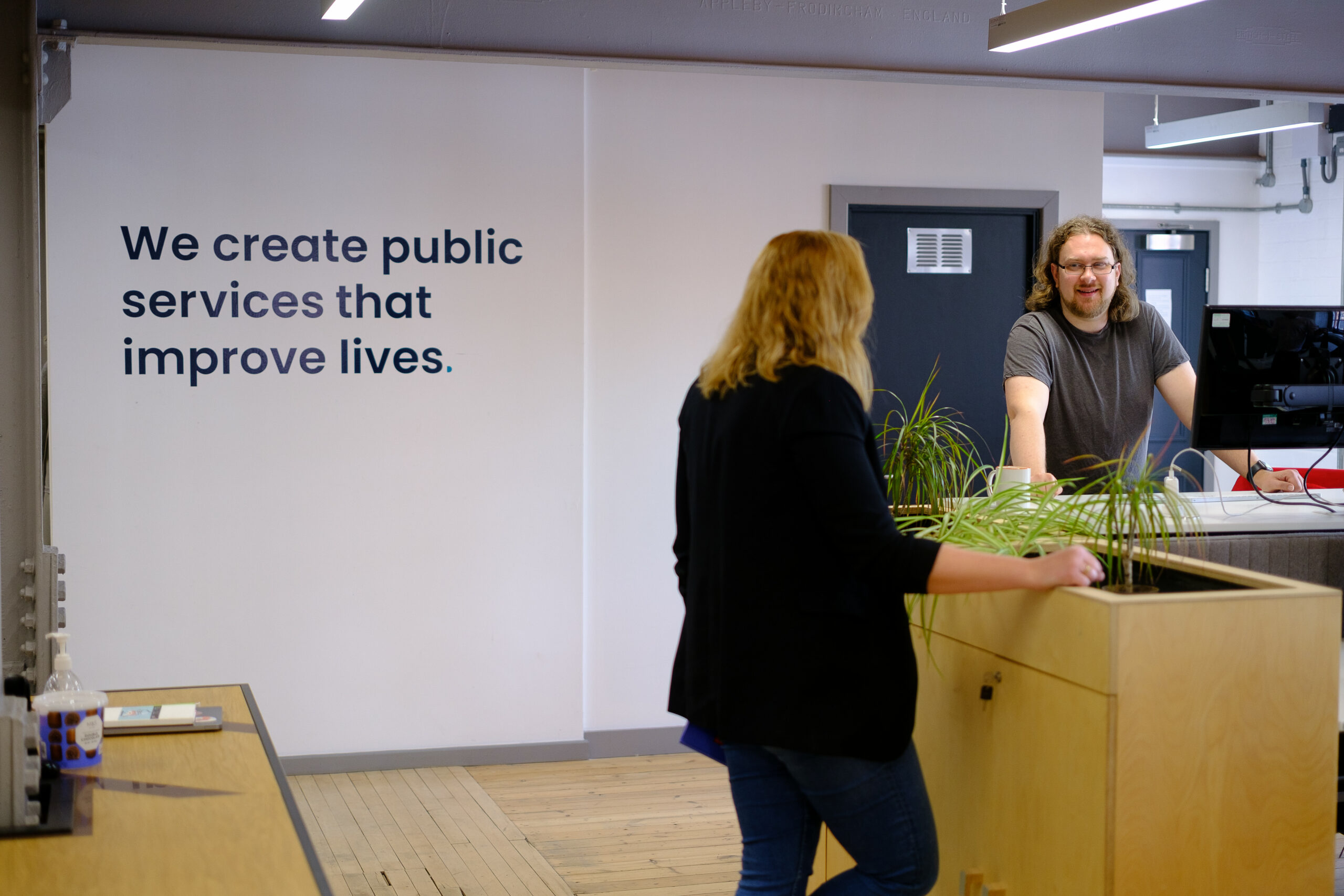
There isn’t a single definition of culture
Building the foundations for an inclusive and accessible festival of culture in Leeds
Back in 2015, the city of Leeds decided to bid for European Capital of Culture 2023. But after the UK’s vote to leave the EU, UK cities were banned from entering. With cross-party support, the backing of more than 20 local businesses and a public poll in the Yorkshire Evening Post, the city decided to go ahead with Leeds 2023 City of Culture anyway.
The part we played
dxw led the research for the digital part of the Leeds 2023 experience, with a particular focus on inclusion.
Leeds 2023 wanted to involve over 75% of Leeds’ 830,000 residents in its programme of activities. But the team knew that despite support for the Year of Culture, some people were excluded. They asked us to identify the barriers to people taking part in Leeds 2023 and how to design services to overcome them.
To find out what the public in general, children and families, and people we don’t usually hear from think, we carried out both planned and spontaneous research. We asked questions at partner agencies’ research sessions, led co-design sessions and carried out guerrilla interviews in Leeds city centre.
What is culture and what makes a good experience?
When you start asking people about a ‘Festival of Culture’, it quickly becomes clear that there isn’t a single definition of culture. In fact, the word ‘culture’ itself can be off-putting for people who assume it’s high brow and not for them.
When we asked socially active people (the kind that use social media a lot and are always out and about) how they assess events and experiences, they said, “if it says it’s “family friendly” then that’s usually an indicator that it’s not for me”. Trying to appeal to everyone can mean you end up appealing to no one.
Food and drink also play an important role. If you’ve ever been part of a family or group where dietary requirements are a consideration, this comment will resonate with you, “I’ll always look at what food options are available as I have one fussy eater and another who can’t eat gluten or dairy”.
Surprisingly, there wasn’t a huge amount of concern about Covid. But the 2017 Manchester Arena bombing and the cost of living crisis were very much on peoples’ minds.
Our insights
The insights we gathered focused on behaviours, needs and attitudes and were critical to the success of the festival. What we learned complemented the demographically-focused research done by other agencies. Our findings went beyond just the digital parts of the experience and were applied more broadly across the entire festival.
There was a digital design agency waiting in the wings to find out how to best design the attendee touch points. Delivering insights that the alpha designers could actually use was our goal, so we packaged up what we had learned into tools. We were restricted by time and budget, so had to be selective.
The tools we developed
Using a blend of our own and existing research, we created 6 rich personas based on the archetypes identified during the research. These were sketch outlines of typical users to which we later added a persona story to bring them to life. They were designed to help colleagues focus on the user and their needs during the design and build process.
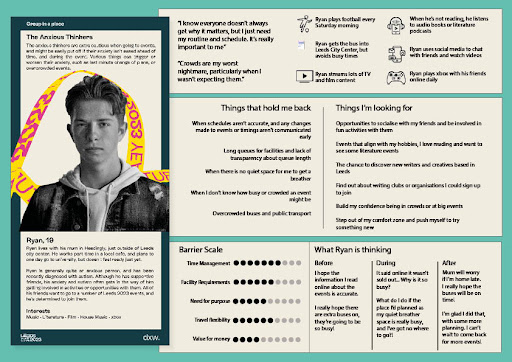
‘The Anxious Thinkers’, one of the 6 personas we created
The personas included the archetype, persona story, their thoughts, tools and toys, their drivers, hurdles, barriers and concerns.
We also developed 5 experience principles to help deliver a user experience in a way that not only helps reduce barriers, but also produces moments that leave a positive lasting impression.
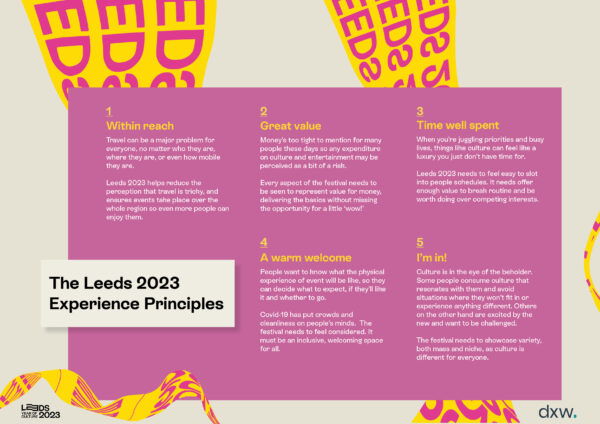
The 5 Leeds 2023 experience principles
Each principle describes a set of steps on a Path to Participation which, if successfully followed, help address peoples’ barriers, and move them towards engagement and beyond.
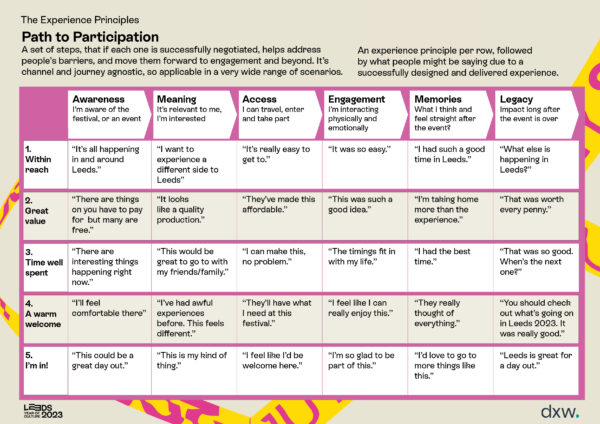
Leeds 2023 Path to Participation
Because principles are not tied to a particular channel or journey, they’re applicable in a wide range of scenarios.
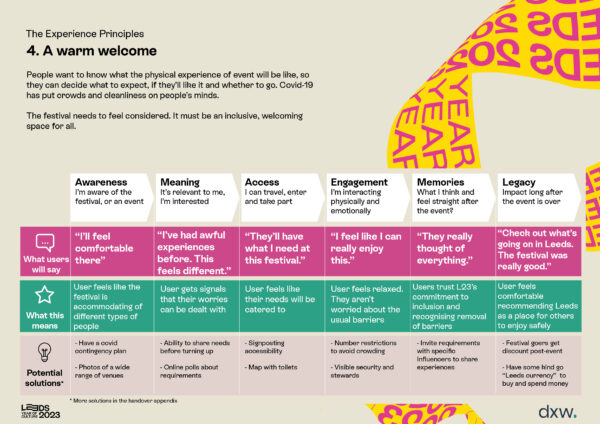
Experience Principle 4: A warm welcome
Each step comes with:
- a target mindset
- what people should be saying, thinking or feeling
- what this means for each principle and its impact
- examples of what solutions to people’s barriers might look like
The Path to Participation packaged up all 5 experience principles.
The difference the tools made
The work was really well received by our client:
“The show and tell was great. I was really pleased. What your team is doing is exactly what I love, so it is really nice to see a great team bring it together like that, I feel amongst friends! Lots of positive feedback on this side afterwards too.
Really, really rich, especially really well articulated”.
The tools we developed informed a number of areas, for example, volunteer recruitment and marketing content as well as encouraging broader engagement with the festival.
After we finished up
The client team created short videos of our 6 personas to help increase their take-up across the festival’s design. There are lots of examples of how our research influenced things. Inspired by one of our personas – The Anxious Thinkers – for example, the web team included a feature to show how busy a venue might be at a certain time.
With our headquarters in the city, we’re especially pleased to have played a part in the success of Leeds 2023.